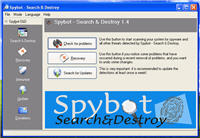Bustin' malware!

Whenever a Windows PC starts to misbehave - running slow, crashing, locking up, displaying odd messages and so forth - there are chance that the problem is down to some sneaky malware that's made it onto the system. At these times there are a few tools that I bring out to check the system over and hopefully make it better.
I know that different people have different experiences, but overall I can run Windows systems with relatively few hassles (your mileage may vary!). By only installing applications that I need, updating drivers on a regular basis and keeping the installations of trial software and betas to a minimum (that's what virtual PCs are for ...) I can keep my Windows-based systems ticking over just fine. But I also come across a lot of people who have shocking trouble with their PCs. These problems can be as a result of an almost infinite number of things going wrong, but more and more, the presence of malware on a system is the root cause of the misbehavior.
Malware can get onto a PC with shocking ease. The easiest way for it to get onto a PC is to go browsing the seedier parts of the Internet with an unpatched Internet Explorer and an unpatched copy of Windows. Using this dodgy configurations it's possible for a system to be taken over in a matter of seconds. All it takes is one Trojan Horse to come into your digital kingdom and the walls are breached and more can follow. Once a system is under the control of malware, it can be darn hard to regain control of the system without resorting to nuking the OS and starting from scratch.
Fortunately, there are some good (and free, for non-commercial use) tools available for folks to deal with a malware infestation. Here is a tour of my favorite tools.
Next -->
Spybot Search & Destroy
One of my all-time favorite malware bustin' tools is Spybot Search & Destroy. This has to be one of the best anti-spyware products available and has a much better detection rate than most antivirus products available. I find Spybot S&D to be particularly good at fixing hijacked Internet Explorer home pages and removing random bits of adware from systems.

Also from the makers of Spybot S&D are three other really useful applications in the war against badware:
- RunAlyzer Autostart and configuration manager that allows you to view and edit all programs and services that start up on a system.
- FileAlyzer A file analysis tool.
- RegAlyzer A registry editor with a few nice features such as the ability to easily view security information on registry keys.
Ad-Aware 2007 Free
Ad-Aware is another free anti-spyware tool that seems to be a very effective tool in the battle against malware.
The new 2007 version of Ad-Aware sees a completely redesigned scanning engine which is a lot faster and more accurate than previous versions.
SmitFraudFix
Now we come to a lesser-known tool in the battle against malware. SmitFraudFix is a tool that effectively deals with a number of desktop hijack malware including AdwarePunisher, SpyLocked, VirusBurst, and WinMediaCodec.
SmitFraudFix runs through a command prompt but don't let that fool you, it's very effective at what it's designed to do and not only have I used it but I've heard good things about it from countless other users.
HijackThis
HijackThis is an advanced tool for spotting malware buried in a system. This tool is not for the basic users out there because it brings up a whole load of false positives, but it does have its uses. It's very useful for finding badware buried deep in a system.
If you know what you're doing, you can fire up HijackThis and sift through the log files yourself looking for nasties, if not, you can always post your log file to the support forum and hope that one of the members there is able to help you.
Other useful tools
There are a couple of other useful tools that I want to mention. The first is a free antivirus product from Avira called AntiVir PersonalEdition Classic. This offers protection against viruses, worms and Trojans and it can find and delete rootkits. You can also load this app onto a USB flash drive and carry it around with you.
The other tool is the McAfee AVERT Stinger. This is a cut-down, stand-alone antivirus utility that can be used to detect and remove certain viruses. This utility scans for medium and high risk threats and it's another tool well worth adding to a USB flash drive for emergencies.
Feel free to add links to your own favorites malware bustin' tools in the TalkBack section.
<< Home >>